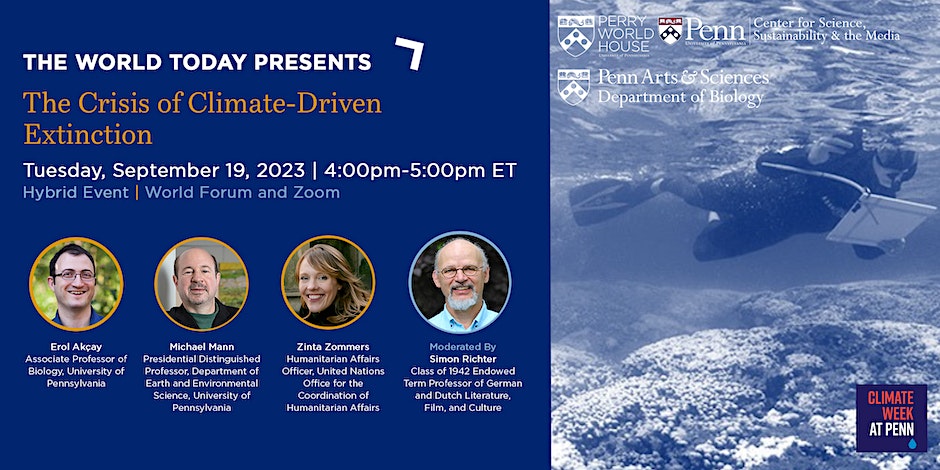A discussion on climate change's role in biodiversity loss, and what can be done to reverse course.
Canadian and Hawaiian wildfires; a bleached Great Barrier Reef; flooding in Pakistan and Nigeria; drought in Somalia; and devastating Cyclones across Malawi and Mozambique are just some of the recent climate driven natural disasters rearranging and challenging the ecosystems on which we all depend.
The United Nations calls the confluence of climate change, biodiversity loss, and pollution a “triple planetary crisis.” A million species are at risk of extinction by 2050. Despite global calls to act, the world is suffering increasingly severe and often irreversible impacts of climate change on ecosystems and the life they sustain. Is climate driven extinction unavoidable? What can be done to reverse course, and can we stop biodiversity loss, global warming, and planetary pollution concurrently? What happens if we fail?
As part of Penn Climate Week, Perry World House in collaboration with the Penn Center for Science, Sustainability and the Media; and the Department of Biology will host this urgent discussion of the intersection of biodiversity loss and climate change.
Register here
SPEAKERS
Erol Akçay is an Associate Professor of Biology at the University of Pennsylvania. He is a theoretical biologist interested in the evolution of complex biological and social organization. He works on how individuals with conflicting interests evolve to cooperate with each other. He has worked on systems varying from plant-microbe mutualisms to animal behavior and cultural evolution in humans. Dr. Akçay’s research has been published by Science, the American Naturalist, Nature Communications, Proceedings of the National Academy of Sciences, and more. Dr. Akçay’s lab is affiliated with the Evolution Cluster, the Warren Center for Network and Data Sciences, the Social and Cultural Evolution Working Group (SCEW), and MindCORE.
Michael Mann is Presidential Distinguished Professor in the Department of Earth and Environmental Science at the University of Pennsylvania, with a secondary appointment in the Annenberg School for Communication. His research focuses on climate science and climate change. He was selected by Scientific American as one of the fifty leading visionaries in science and technology in 2002, was awarded the Hans Oeschger Medal of the European Geophysical Union in 2012. He made Bloomberg News‘ list of fifty most influential people in 2013. He has received the Friend of the Planet Award from the National Center for Science Education, the Stephen H. Schneider Award for Outstanding Climate Science Communication from Climate, the Award for Public Engagement with Science from the AAAS, the Climate Communication Prize from the American Geophysical Union and the Leo Szilard Award of the American Physical Society. He received the Tyler Prize for Environmental Achievement 2019 and was elected to the National Academy of Sciences in 2020. He is a Fellow of the AGU, AMS, GSA, AAAS and the Committee for Skeptical Inquiry. He is co-founder of RealClimate.org, author of more than 200 peer-reviewed and edited publications, numerous op-eds and commentaries, and five books including Dire Predictions, The Hockey Stick and the Climate Wars, The Madhouse Effect, The Tantrum that Saved the World, and The New Climate War.
Zinta Zommers is a humanitarian affairs officer with the United Nations Office for the Coordination of Humanitarian Affairs. She is a specialist in risk management and climate change adaptation, working to reduce vulnerability to climate shocks by strengthening early warning and anticipatory action systems. Zommers has held a variety of roles with the UN, including as part of the Secretary-General’s climate change team and a member of the UN Chief Scientist’s Office. She is also a lead author of the Intergovernmental Panel on Climate Change and has authored and edited two books on climate change adaptation and early warning systems. Zommers has an MPhil in development studies and a DPhil in zoology from the University of Oxford, where she was a Rhodes Scholar.
MODERATOR
Simon Richter is the Class of 1942 Endowed Term Professor of German and Dutch literature, film, and culture. Professor Richter’s research deals with cultural aspects of adaptation, resilience, and migration in the context of the climate emergency. He focuses in particular on the role of narrative in imagining and designing optimal responses to future climate scenarios in Germany, Indonesia, The Netherlands, and the United States.



